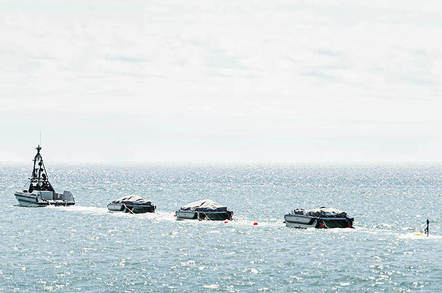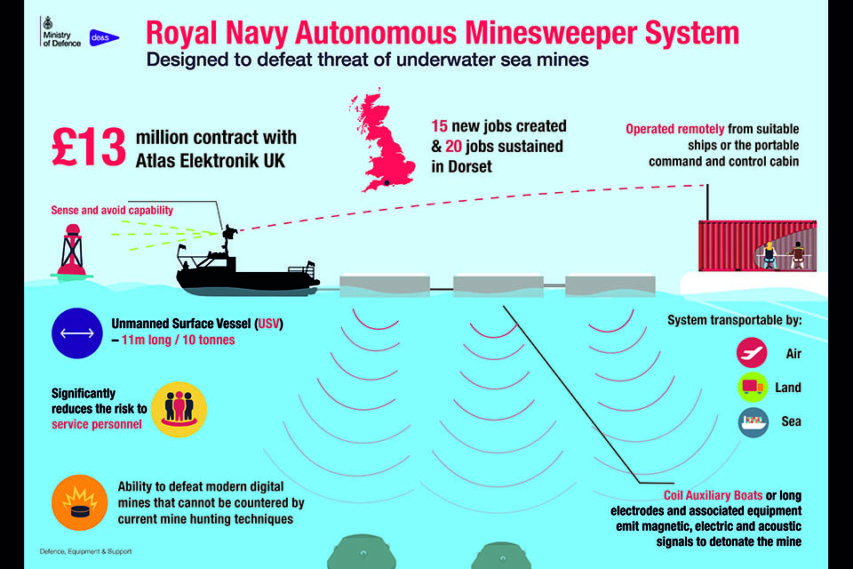At The Register Gareth Corfield updates us on the latest step towards Skynet, uh, Seanet:
The Royal Navy has acquired a search-and-destroy robot boat intended for destroying mines.
A first for Britain’s naval service, the roboat, built by German firm Atlas Elektronik’s UK subsidiary, drives itself around the high seas towing three auxiliary boats fitted with electro-acoustic transmitters. The transmitters generate pings that trigger modern digital mines at a safe distance from either the roboat flotilla or actual human-carrying shipping.
So far the MoD’s £13m contract with Atlas has netted it one complete boat-with-gear system on an R&D basis, with options available to buy more. The trials boat has just been handed over to the RN following proving of the design’s detect-and-avoid algorithms in what appears to be a live training data-versus-AI comparison exercise.
In maritime terms, the roboats comply with the International Regulations for the Prevention of Collisions at Sea (known as the Colregs – they’re the seagoing version of the Highway Code), though The Register would be most intrigued to see how they cope with scenarios that end up invoking rule 2(b).*
“This autonomous minesweeper takes us a step closer to taking our crews out of danger and allowing us to safely clear sea lanes of explosives, whether that’s supporting trade in global waters and around the British coastline, or protecting our ships and shores,” said defence procurement minister Guto Bebb in the usual canned quote.
* Rule 2, as published (PDF) by the Department for Transport, states: “Construing and complying with these Rules due regard shall be had to all dangers of navigation and collision and to any special circumstances, including the limitations of the vessels involved, which may make a departure from these Rules necessary to avoid immediate danger.”
Update, 14 May: UK Armed Forced Commentary has more information on the unmannned minesweeper system.
12 October 2005 was an historic day for the Royal Navy, because the Hunt class minesweepers HMS Middleton and HMS Ledbury conducted the last evolution at sea involving sweep gear, both the Oropesa mechanical wire system and the combined influence sweep equipment. The Royal Navy at that point had already operated unmanned, remotely controlled sweep systems in 2003 during waterway clearance work in Iraq, notably the opening of Umm Qasr. Under a UOR, a number of Combat Support Boats with remote controls were used to tow the Mini Dyad System (MDS) produced by Australian Defence Industries (ADI) and Pipe Noise Makers. Called Shallow Water Influence Minesweeping System (SWIMS), they were sent ahead of the RN minehunters as precursor sweeps against ground influence mines. The future of MCM was taking the path of stand-off action through unmanned systems and it was felt that the more than 100 years of manned ships sweeping were at an end.
The replacement for the sweep equipment was to come through the Flexible Agile Sweeping Technology, or FAST. The idea was to put two unmanned surface vehicles on the Hunt class vessels by modifying their open, capacious stern area. FAST, however, proved anything but fast, and even though a contract was signed in 2007 by the MOD with the Atlas-QED consortium, comprising Atlas Elektronik UK, QinetiQ and EDO Corporation, the resulting Technology Readiness Demonstrator never made it on the Hunt class. FAST became a test platform that spent the following years doing all sort of trials and demonstrations. Initially intended only for towing sweep kit, it ended up testing remote deployment and recovery of Sea Fox unmanned underwater vehicles, demonstrating that stand off clearance of minefields was possible.
Atlas Elektronik UK continued to work with the MOD and on its own, and eventually developed in-house the ARCIMS (ATLAS Remote Combined Influence Minesweeping System) system, which has enjoyed a first export success in an unnamed Middle East navy and has gone on to become the much delayed replacement for the Hunt’s sweeping capability within the Royal Navy.
An ARCIMS seaframe, but manned, was delivered to the Royal Navy in 2014 for trials and development purposes, and remains in service with the Maritime Autonomous System Trials Team (MASTT) of the Royal Navy as RNMB Hazard.
On 6 march 2015, Atlas received a 12.6 million pounds order from the MOD for a first ARCIMS-derived system, in the unmanned configuration, configured to tow sweeping equipment. The system has now been accepted, and according to MASTT, which has already trialed it extensively, the new boat is called RNMB Hussar.





